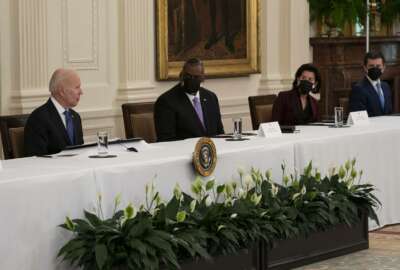

Federal contractors who ship stuff often overlook or don't put a lot of bother into compliance with obscure federal shipping rules.
Best listening experience is on Chrome, Firefox or Safari. Subscribe to Federal Drive’s daily audio interviews on Apple Podcasts or PodcastOne.
Federal contractors who ship stuff often overlook or don’t put a lot of bother into compliance with obscure federal shipping rules. Now with a refreshed federal emphasis on Buy American, that could be a costly mistake. Federal Drive with Tom Temin got details from Thomson Coburn attorney Jayna Marie Rust.
Interview transcript:
Tom Temin: Ms. Rust, good to have you on.
Jayna Marie Rust: Thanks so much for having me, Tom, I appreciate it.
Tom Temin: And what you have written about, what you’re advising people about concerns shipping on ships over water, correct?
Jayna Marie Rust: Yes, I provided some insights earlier to folks about what the Cargo Preference Act requirements require both under the [Federal Acquisition Regulations]-type contract and [Defense Federal Acquisition Regulations]-covered contracts.
Tom Temin: And the cargo preference clauses are actually more than one clause and more than one statute, fair to say?
Jayna Marie Rust: Yes, that is definitely true. There is statues that applies to military contracts or Department of Defense contracts, and that’s the Military Cargo Preference Act, and then the Civilian Cargo Preference Act is it the law that governs civilian covered contracts.
Tom Temin: And a lot of people cite the Jones Act, is that part of the civilian side? Or is that something else altogether?
Jayna Marie Rust: I mean, it is part of the federal government’s “ship American” type policy, but it’s not a clause that is specific to government contractors. So contractors would need to comply with the Jones Act, but it’s not going to be something that’s going to appear in one of their contracts as a FAR or DFARS clause.
Tom Temin: Okay, so let’s go back to the Civilian Cargo Act, then, which would apply on the civilian side. How old is this law, and basically, what does it require in different shipping situations?
Jayna Marie Rust: So it’s a law that’s been around for almost 70 years, I think. It was passed in 1954. And it was an amendment to a previous law – it basically requires the government to ship at least 50% of the gross tonnage of all government cargo on privately owned U.S. flag commercial vessels. And the government then passes that requirement on to its contractors through a FAR clause.
Tom Temin: And that could be shipping from overseas or to overseas, and also within the United States, I guess there’s canals and things he might use to ship?
Jayna Marie Rust: Correct. The Jones Act would typically be a requirement that already requires the use of U.S. flag vessels for shipping within the United States or even port to port in the United States. But then the Civilian Cargo Preference Act is really going to be what governs whenever there’s shipment between countries.
Tom Temin: All right, and I guess, in military that would even apply more frequently. And what about the Military Cargo Act, pretty much an analogue to the civilian cargo act or other special military provisions in there that don’t apply in the civilian side?
Jayna Marie Rust: Well, so the Military Cargo Preference Act has a higher percentage of requirement for the amount of cargo that needs to be shipped on U.S. flag vessels. And that requires that all cargo be shipped on U.S. flag vessels.
Tom Temin: And I guess the question that comes up is, does the U.S. shipping industry have enough capacity? Because it’s pretty small compared to – most of the ships you see are registered in Panama or Turkey or almost everywhere but the United States?
Jayna Marie Rust: Yeah, so most of the shipping industry has been moving away from the United States over the years. The number of U.S. flag vessels has decreased over the years and the share of US flag vessels as comparison to the rest of the global flag vessels is shrinking. But there is still a healthy number of US flag vessels available. The question is, though, sometimes are those vessels going to be able to meet the schedule that a contractor needs and sometimes to get a US flag vessel to transport the cargo may mean a significant change in schedule or may require a significant amount of planning in advance to make sure that you can use a US flag vessel to meet your needs.
Tom Temin: We’re speaking with Jayna Marie Rust, she’s an attorney with the law firm Thomson Coburn. And what happens if you don’t comply? What are the penalties? And I guess I want to get a sense of how often contracting officers check this kind of thing.
Jayna Marie Rust: I guess I’ll try to answer the first part first, as far as the penalties, is something that a contracting officer has some discretion as far as what actions may be taken. There could be a determination that the contractor is not responsible, there is some case law that suggests that contracting officers can make such a determination. Contracting officers can also require payments back to the United States as far as the difference between the amounts for the shipment on U.S. flag vessels versus foreign flag vessels. So there’s a couple of options and probably even some more options beyond that. I think those are probably the more typical or likely scenarios to occur with probably the payment being an even more likely scenario. And then as far as how often does this come to contracting officers attention? It does come to their attention sometimes. It may come to the attention of the contracting officer through the program. It may also come to the attention of the contracting officer through some – I don’t want to say lobbying, but some action by U.S. flag vessels or owners of U.S. flag vessels who are trying to make sure that contractors are complying with these requirements. So there’s a handful of ways that this can come to their attention. But as you mentioned, at the top of this discussion, there is also an increase in attention to Buy American or Made in America or domestic preference – however, you want to call it – laws and requirements. And this is one of them. And it is something that does have the attention of folks on Capitol Hill as well as in the White House.
Tom Temin: So the Buy American executive order, which like all of these executive orders that are coming out is voluminous and a lot of language in there, but that does discuss shipping by flag carriers?
Jayna Marie Rust: I don’t believe that the executive order itself does but a recent Office of Management Budget memoranda does discuss this in the context of that executive order. So, it’s clear that folks in the White House are considering this to be part of the Made in America policy the Biden administration is looking at right now.
Tom Temin: And do contractors ever have an out? For example, suppose they say, well, the requirement was that this material needed to be received by Dec. 15, but there wasn’t any American flag carrier leaving until Dec. 14. And so therefore, to be on time to fulfill the main part of the contract, we had to use the Panamanian clipper, which left Dec. 1.
Jayna Marie Rust: There is a process under both the FAR and DFARS clause to obtain waivers for these requirements. The process for going through them is different for each clause. But the question is going to be, is there a different way that this could have been achieved? Is there a different product even that could be purchased that doesn’t need to be shipped via these vessels? And then, once there’s been a consideration of a number of different factors, then a waiver may be granted. But most likely, it seems as though those types of waivers are going to be the type that has to go through the Made in America office the Biden administration is in the process of creating, so those types of waivers are going to be under more scrutiny. And I suspect that that means that contractors as they ask for these are going to also be facing more scrutiny themselves.
Tom Temin: So like you said earlier, it’s better to plan ahead than try to go after a waiver?
Jayna Marie Rust: Yes. And it’s going to be I think, even more difficult to obtain a waiver after the fact I think there are [the] possibility for that to happen. But because of the waiver process now being much more visible, I think it’s going to be even more difficult to obtain those waivers after the fact.
Tom Temin: I guess worst of all financially would be to make up the emergency by shipping by air.
Jayna Marie Rust: Yes. Although for some of these items, it probably wouldn’t even be possible to ship by air. A lot of I think the types of items where this can come up are the construction type contracts, or I should say the construction contracts and the weight of the items is just going to be too significant to use air.
Tom Temin: Yeah, steel reinforced concrete columns don’t fit very well in an airplane and they may not get off the ground. Alright, interesting insight. Jayna Marie Rust is an attorney with Thompson Coburn. Thanks so much for joining me.
Jayna Marie Rust: Thanks so much for having me, Tom. I appreciated it.
Copyright © 2024 Federal News Network. All rights reserved. This website is not intended for users located within the European Economic Area.
Tom Temin is host of the Federal Drive and has been providing insight on federal technology and management issues for more than 30 years.
Follow @tteminWFED



